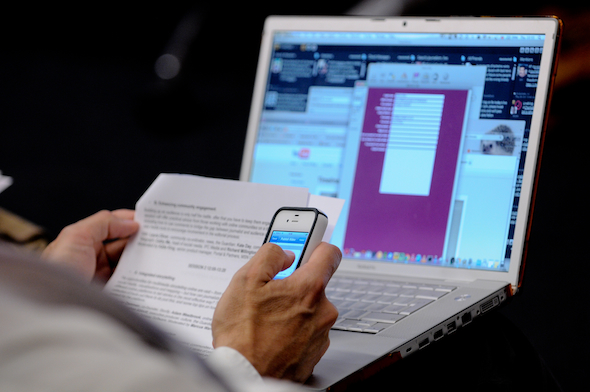Journalism.co.uk’s news:rewired – connected journalism conference took place at MSN HQ, London on Thursday. Here is round-up of some of the blog posts about the event so far.
Founder of POLIS Charlie Beckett gave the keynote speech and has helpfully posted the points he made on the LSE’s website, explaining why we need networked journalism in an age of complexity and uncertainty. You can see Beckett’s speech in this video, which was filmed by the BBC College of Journalism.
Session #1A: newsroom architecture
Rosie Niven’s post on the architecture of the newsroom gives a hugely useful outline of lessons from the speakers, Helje Solberg of Norway’s newspaper VG, Karl Schneider from Reed Business Information and Sky News’ James Weeks, and adds her experiences of news flow and where people sit at places she has worked as an online journalist, including BBC Television Centre, BBC Lodnon and Channel 4.
TheMediaBriefing’s Patrick Smith has also written a post on the session, focusing on the presentation given by Solberg of VG. The post includes a video and an interesting summary point.
The paper has 452,468 fans on Facebook and staff are told to spend 10 percent of their working day on social media. “That’s how all journalists have to work today – they have to be multi-skilled and get involved in social media. That’s why we don’t have community managers, not least at yet,” Solberg says.
Wannabe Hack the Entrepreneur has also blogged about VG’s 10 per cent rule, outlining why younger journalists are at an advantage having grown up with social media.
Session #1B: enhancing community engagement
Meanwhile, on the subject of communities, the Wannabe Hacks provide a round-up of the enhancing community engagement session.
Session #2A: Integrated storytelling
The Guardian’s Hannah Waldram collected together her notes on the session, along with a series of other tweets and images, in this Storify.
Session #3A: bringing the outside in
TheMediaBriefing editor Patrick Smith has a video and post up on the presentation given by Carla Buzasi, editor-in-chief of the Huffington Post UK. Interesting reading for anyone interested in the strategic thinking behind HuffPo UK, which launched in July.
Session #3B: collaboration in investigative journalism
The Guardian’s Hannah Waldram has neatly summarised the session on collaboration in investigative journalism, in which all four panellists agreed that the time has come for end of the scoop.
It is a point echoed by the Undergrad on Wannabe Hacks.
It’s an exciting time for journalism and I think as a generation of journalists, we can teach a lot to those who’ve been doing the job for a while. We are used to using Twitter and Facebook and other social networks that more mature journalists may be unfamiliar with. And all of these will be helpful for arranging collaborations and getting people involved in investigations.
So give up your desire for the scoop. The scoop is dead. Collaboration is the future.
General posts
A post on thiswritingbusiness, Connected journalism – and how it applies to you, picks up on various lessons from news:rewired, and reflects on points made throughout the day. Key takeaways from the day include that you don’t have to be a content creator to be in the news business, and how “helping your target audience navigate the quagmire” by curating and providing links is “enough to justify your presence”.
That theme of linking is picked up by Ed Walker, multimedia producer at Trinity Mirror, in a post headlined News organisations linking out: Is the BBC linking to the right places? He shares his thoughts on Steve Herrmann, editor of BBC News, who told the final session how the BBC now is sending an average of 6.1 million click-throughs per month to external sites, including 80,000 per month to the Mail Online, something he blogged about on the BBC Editors’ Blog on Friday (7 October).
Walker highlights the fact that where news sites do not have a culture of linking and transparency, a prominent site rather than the source could get the credit. He asks how the BBC ensures that it is being fair.
But how does it decide to credit a news source within a story, when it writes ‘as revealed by the Daily Telegraph’. But what, as with a lot of the more human interest and quirky stories, they’ve started out on page seven of a local weekly paper? Will the BBC still link to the Daily Mail’s rip-off version or will it seek out the original source to link back to and reward the media organisation who sourced that story in the first place?
SoundCloud’s Ben Fawkes has put together a Storify, demonstrating how the SoundCloud audio player can now be added to Storify now that the two platforms have partnered, and has cleverly used SoundCloud’s new partner’s platform to explain how journalists can use its own.
Journalism.co.uk also produced a Storify providing a round-up of news:rewired – connected journalism.
Stay tuned to news:rewired for full presentations from our speakers, which we’ll be posting on the site soon.

